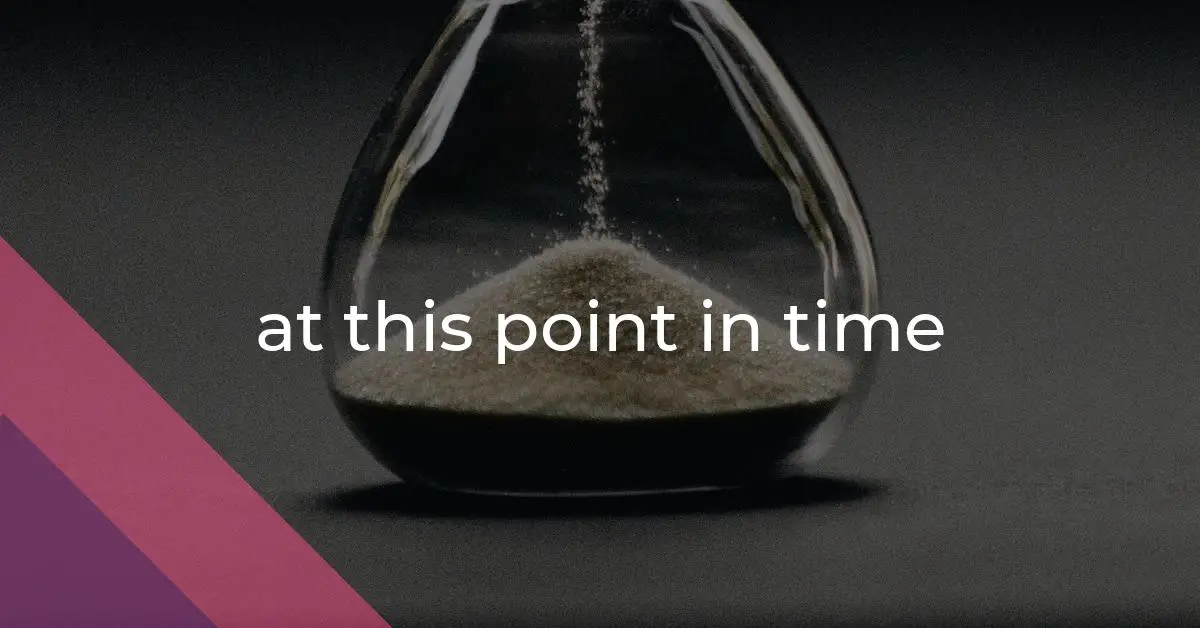at this point in time: Idiom Meaning and Origin
What does ‘at this point in time’ mean?
The idiom "at this point in time" means currently or at the present moment. It emphasizes the specific time frame being referred to and is often used when discussing a particular stage or situation.

Idiom Explorer
The idiom "it's about time" is used to express that something should have happened sooner or that someone is overdue for a certain action or event.
The idiom "in this day and age" refers to the present time or era, emphasizing its contrast with the past. It expresses the idea that things have changed significantly and highlights the modern advancements and developments that currently exist.
The idiom "in the right place at the right time" means being present at the perfect moment or location to take advantage of an opportunity or a fortunate event.
The idiom "in the here and now" means focusing on the present moment and not dwelling on the past or worrying about the future.
The idiom "in no time" means very quickly or without delay, suggesting that something will be completed or happen in a short period of time.
The idiom "high time" means that something should have happened or should be done immediately, as it is already late or long overdue.
The idiom "for the time being" means temporarily or for now, referring to a situation that is not permanent.
The idiom "day and age" refers to the present time period. It is used to emphasize that certain beliefs or practices are different now compared to the past.
The idiom "any time now" is used to convey that something is expected to happen very soon or at any moment. It implies a sense of anticipation or readiness for an event to occur.
Unveiling Its Enigmatic Origin
The idiom "at this point in time" is a commonly used phrase in the English language. It is typically used to indicate the present moment or the current state of affairs. The phrase is often used in formal contexts to convey a sense of specificity and precision. "At this point in time" is considered a more formal alternative to the phrase "at this moment."
While the exact origins of the idiom are unclear, it is likely a variation of the more commonly used phrase "at this point." The addition of "in time" serves to emphasize the temporal aspect of the phrase, distinguishing it from a more general reference to a specific point in space. This emphasis on time is particularly relevant when discussing the progression of events or the timing of certain actions.
The idiom is believed to have gained popularity in the mid-20th century and has since become a standard part of the English language. Its inclusion in formal writing and speech can be attributed to its ability to convey a sense of precision and formality. The use of "at this point in time" suggests a deliberate choice of words and a desire to be exact in one's language.
One interesting feature of the idiom is its redundancy. The phrase "at this point" already implies a reference to time, rendering the inclusion of "in time" somewhat superfluous. However, the addition of "in time" serves a rhetorical purpose by emphasizing the temporal aspect and reinforcing the speaker's intention to be precise and accurate. It can also lend a somewhat formal tone to the statement.
It is important to note that the idiom "at this point in time" is not the only way to express the concept of the present moment. There are numerous other idiomatic expressions that can be used interchangeably, such as "right now," "currently," or simply "at this moment." The choice of which phrase to use may depend on the context and the desired tone of the communication.
Another synonymous expression related to "at this point in time" is "at any given moment." This phrase carries the same idea of emphasizing the present moment, but it broadens the scope to refer to any specific moment in time. While "at this point in time" focuses on the current moment, "at any given moment" suggests that the situation or state of affairs can change rapidly and unpredictably. It conveys a sense of the dynamic nature of time and the potential for shifting circumstances.
In addition, the idiom "in the here and now" is also related to "at this point in time." It is another way to refer to the present moment or the current state of affairs. "In the here and now" implies a sense of immediacy and significance. It can be used to highlight the importance of paying attention to the present moment and not getting caught up in past or future concerns.
Similarly, the phrase "for the time being" is related to "at this point in time." It suggests a temporary or provisional state of affairs. While "at this point in time" refers to the current moment or state of affairs, "for the time being" implies that the situation may change in the future. It acknowledges the potential for the passage of time and the possibility of evolving circumstances.
Lastly, the idiom "in this day and age" can also be related to "at this point in time." It is used to emphasize the current period or era in which we live. "In this day and age" suggests a recognition of the unique characteristics and challenges of the present time. It conveys a sense of the historical context and the specific conditions that define the current state of affairs.
The idiom "at this point in time" is a formal and precise way to refer to the present moment. Its origin is uncertain, but it has become a common phrase in the English language. While the inclusion of "in time" may be redundant, it serves to emphasize the temporal aspect of the idiom. Other synonymous expressions exist, such as "at any given moment," "in the here and now," "for the time being," and "in this day and age," but "at this point in time" offers a sense of formality and specific temporality. Its usage conveys precision and a deliberate choice of words. The idiom continues to be widely used in formal contexts and is an accepted part of the English language.
Example usage
Examples of how the idiom "at this point in time" can be used:
1. The company's profits are at an all-time high at this point in time.
2. At this point in time, it is unclear whether the project will be completed on schedule.
3. We are not hiring new employees at this point in time.
More "Temporal" idioms



